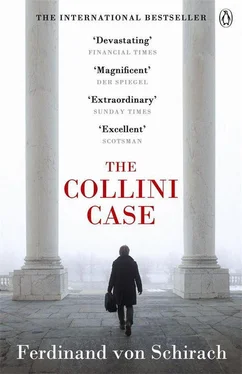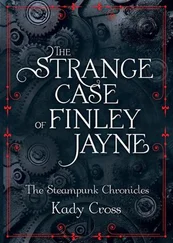And now, six years later, he called her phone number from his tiny office. She picked the phone up at the first ring.
‘Hello, Johanna.’
‘At last! I’ve been trying to get in touch ever since yesterday. I didn’t have your mobile number. Caspar, why are you doing this?’
He was surprised; she sounded furious. ‘What do you mean?’
‘Why are you defending that bastard?’ She began to cry.
‘Johanna, do calm down. I don’t understand a word you’re saying.’
‘It’s all over the media. You’ve taken on the defence of that Italian.’
‘But… wait… wait a moment…’ Leinen got to his feet; his briefcase was still on the desk. He fished the arrest warrant out from among the other papers. ‘Johanna, he shot someone called Jean-Baptiste Meyer, that’s what the warrant says.’
‘My God, Caspar, “Jean-Baptiste” is only the name in his passport.’
‘What are you talking about?’
‘You’re going to be defence counsel for my grandfather’s murderer.’
Hans Meyer’s mother had been French. She called her son Jean-Baptiste, after John the Baptist. But like many of his generation, he didn’t want a long-winded name. If you were called Friedrich in those days you became Fritz; a Reinhard would change his name to Reiner. And Johannes was shortened to Hans. He was known to everyone as plain Hans Meyer; the name was printed that way even on his business cards.
Leinen pictured the dead man for the first time: Hans Meyer, shot in a hotel room, a puddle of blood, police officers, red-and-white barrier tape. He sat down on the floor with his back to the wall. His father’s desk stood at an angle in the room; a piece of wood had split off one of its legs.
As usual, no one knew who had been talking to the press. Later, the public prosecutor’s office assumed that there had been an informant in the ranks of the police; too many details were given. In any case, the biggest tabloid in Berlin made ‘Murder in Luxury Hotel’ the lead headline on the front page of its Sunday-evening edition. The name of the killer meant nothing to anyone, but the victim was well known. He was one of the richest men in the Federal Republic: Hans Meyer, owner and chairman of the board of Meyer Engineering Works, holder of the Federal Cross of Merit. Editorial teams in the news media tried to find out more, they sifted through archives, read old reports. Journalists speculated on the motive for the crime. Most of them suspected economic sabotage; no one could say anything for certain.
The lawyer Professor Richard Mattinger was sprawled on his sofa in his dressing gown, thinking about his wife. It was almost twenty years since she had found this house on the Wannsee. At that time, eight years before reunification, properties here on the lake had been ridiculously cheap, and new families had moved into the old houses. His wife had been right: the value of real estate had greatly increased in the last ten years. She died soon after she had furnished the house, and Mattinger had refused to change anything in it since then.
His dressing gown was open, showing the white hair on his chest. He was letting his girlfriend, a very young Ukrainian woman, masturbate him. She told him how much she loved him countless times every day. Mattinger didn’t care. He knew that a relationship like theirs was always a reciprocal business deal – at best agreeable to both parties for a while. He was in his mid-sixties, still fit and active. In the last days of the war, when he was eight years old, a hand grenade had torn off his left forearm. But his eyes were his most striking feature, dark blue and of enormous intensity.
The telephone rang for the ninth time. Only a few people had his private number, and it must be important if someone was calling him on a Sunday afternoon. When he finally picked up the phone, his girlfriend looked up from between his knees, smiled, and asked if she should go on. It took Mattinger a moment to concentrate his mind. He jammed the receiver between his shoulder and his head, slid a notepad across the coffee table towards him and began taking notes. When he had hung up again, he got to his feet, closed his dressing gown, caressed the girl’s head and went into his study without a word.
Half an hour later, he had his driver take him to his chambers. On the way, he called one of the young lawyers he employed and asked him to come to the office. Mattinger had acted for the defence in the terrorist trials of the 1970s in Stammheim Prison; his appearances in court had been media events. A weekly magazine had once written of him that he had a mind of ‘almost dazzling intelligence’. In those days, perhaps for the first time in German legal history, the rights of the defendants had to be genuinely fought for. At the beginning of the student riots many thought democracy itself was endangered, and terrorists were regarded first and foremost as enemies of the state. Even before the verdict was given, a prison had been built for the defendants. Laws were changed on account of these trials, defence lawyers shouted at the judges, defendants went on hunger strike, and the presiding judge had to stand down from the main trial for reasons of bias. War was waged in court. The defending lawyers learned something new; they became more self-confident, and understood, better than ever before, that justice can be done only in a fair trial. It was too much for many of them. They made common cause with their clients, overstepped the boundary, and became offenders themselves. Tragedies born of rage. Mattinger was different. The public thought he had lent the terrorists his voice, which was clearer and more effective than their own. But that was not so. Of course he had been to demonstrations a few times, had met the students’ spokesmen, but it had alarmed him to see how their own words intoxicated them. In point of fact, Mattinger represented only legality. He was a believer in the constitutional state founded on law.
Since then he had acted as defence counsel in almost two thousand trials. He had never yet lost in a murder trial; none of his clients had received a life sentence. But as time went on his clientele changed. First came the speculators and building contractors, then the bankers, the company chairmen, the old-established families. It was a long time since he’d defended a drug dealer, an underworld boss or a murderer. These days he wrote articles in legal journals, he was chairman of a number of legal associations and a visiting professor at the Humboldt University in Berlin. He lived in an altogether more prestigious world now. He seldom appeared in court; most proceedings against his clients were dropped by the state prosecutor’s office in return for large payments, without ever coming to a full-scale trial. Mattinger still believed in the constitutional state founded on law, but the battles seemed already to have been won. Sometimes, when he was stuck waiting at an airport overnight, he felt as though he had mislaid something. But he didn’t want to stop and work out exactly what.
By the time he reached his chambers, he had already phoned the murder squad. Of course, he knew the top police officers there, and they came up with enough information for him to form a vague idea of events. Two hours later he had the Meyer Works company lawyer, Holger Baumann, on the phone. Mattinger and the young lawyer from his chambers were sitting in one of the large conference rooms, talking to Baumann on speaker-phone. The company lawyer told them that the firm employed over forty thousand people worldwide, with profits year on year almost 4 per cent above the industry average, and they were on the brink of bringing off the biggest deal in their entire history. The murder of Hans Meyer, former chairman of the board and main shareholder of the company, was a catastrophe, said Baumann. They didn’t want the firm all over the papers. He mentioned the bribery case involving a subsidiary a few years ago, and the trial in which Mattinger had represented a leading employee who worked there. There had been unwelcome publicity in the papers at the time. Baumann sounded nervous. Mattinger remembered that he had never liked the man.
Читать дальше












